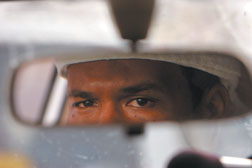A committed jihadist, Abu Jandal got himself a plum job in the ’90s when he became the bodyguard for Osama Bin Laden. After splitting with bin Laden, serving time in prison during 9/11, giving up info to the FBI and returning to his family, he now drives a taxi in Yemen. But back when he was a bodyguard he helped his brother-in-law get a job as Bin Laden’s driver. That man, Salim Hamdan, was not so lucky. Although kept out of the terrorist information loop, Hamdan was captured and held in solitary confinement at Guantanamo Bay.
Laura Poitras’ documentary “The Oath” follows the fate of the two men in an engrossing film that relishes its ambiguities. Poitras followed Jandal for two yeas, shooting his everyday life. For Hamdan, she shows his family and reads from his letters home, written on cartoonish stationery.
 The oath of the title refers to the one sworn by all Al-Qaeda members, declaring their support of authority over everything: family, well-being, reason. Abu Jandal believed in that oath, but at some point he had to give it up, and now he questions his actions. He knows the younger generation of jihadists growing up will be harder of line and less forgiving than he. In one scene some potential candidates question his drinking of Western soda pop. Isn’t this the infidels brew? He responds with a complement about the infidels commitment to quality product, and a criticism about the “dogs” who make Yemen’s colas.
The oath of the title refers to the one sworn by all Al-Qaeda members, declaring their support of authority over everything: family, well-being, reason. Abu Jandal believed in that oath, but at some point he had to give it up, and now he questions his actions. He knows the younger generation of jihadists growing up will be harder of line and less forgiving than he. In one scene some potential candidates question his drinking of Western soda pop. Isn’t this the infidels brew? He responds with a complement about the infidels commitment to quality product, and a criticism about the “dogs” who make Yemen’s colas.
This little aside shows the complexity at work in people like Jandal. A devoted father, a religious man, a friendly taxi driver, a loving husband, and a man who everyday feels the crushing guilt of indirectly causing his brother-in-law’s imprisonment: Jandal is all these things. He is smart, well-spoken, and realistic. Yet he feels no guilt or remorse over the actions of the 9-11 hijackers. It was a necessary action, to him.
Meanwhile, we glimpse the strange world of Guantanamo Bay, with its brilliant surrounding countryside, its factory-farm prison cells, and the media attention when Hamdan comes to trial, a trial closed to journalists.
Hamdan’s case became the basis on which the supreme Court decided in 2006 that Bush’s military commissions violated the Geneva Conventions. With Hamdan vindicated, the Congress immediately passed a law that could be used retroactively to keep Hamdan in prison and tried by a military court. His guilty charges reduced, he served five more months and was released in 2007.
Hamdan never appears in the film, but his absence is powerful, and he becomes a symbol of sorts. Having been the first captured in Afghanistan following our invasion, he stood as a symbol for the greater prize, despite his hired hand status. (Unlike Hamdan, Jandal had met and talked with most of the 9-11 hijackers). To Jandal, he is his conscience, a living reminder that he got away easily. To those who oppose the secret nature of the military tribunals, he represented the way the U.S. government could hold prisoners without due process. And, one free, he became once again a father and a husband, though irrevocably changed.
“The Oath” is an easy film to watch, but a hard one to judge. It leaves the questioning up to us, a complex alternative to mainstream media’s shouting matches.
‘THE OATH’
*** ½
No rating
Length: 90 minutes
Playing at: UCSB Campbell Hall
